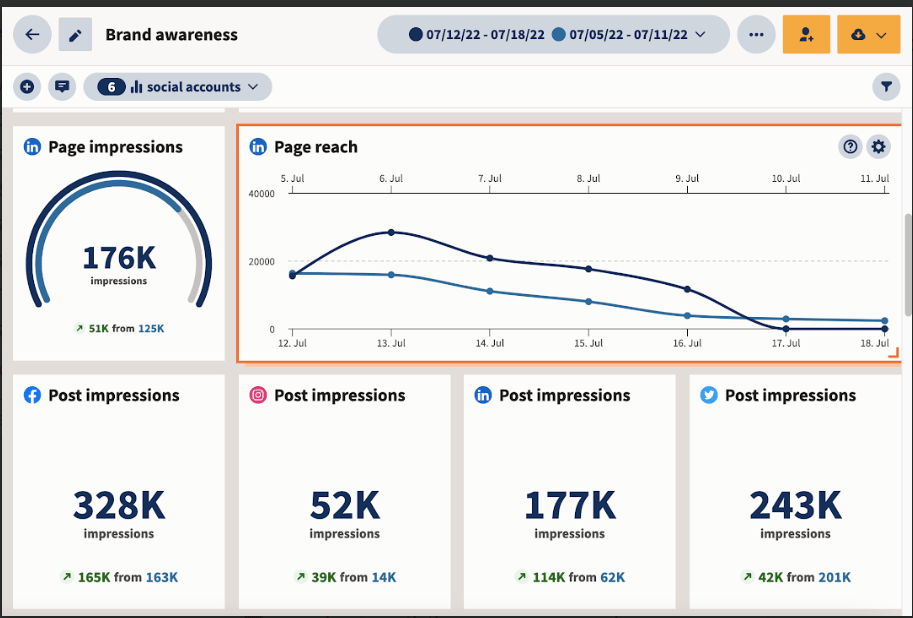In the world today, leveraging social media platforms for marketing is no longer just an option; it’s a necessity. With millions of people actively involved on various social channels, businesses have a unique opportunity to connect with their target audience, promote their products, and build brand awareness. However, to ensure the effectiveness of your social media marketing efforts, it is crucial to measure and analyze the performance of your campaigns. In this blog post, we will delve into the intricacies of how to measure social media marketing performance, ensuring you have all the tools and knowledge needed to optimize your strategy and achieve your business objectives.
Understanding the importance of social media metrics

When it comes to tracking important social media metrics, there are a plethora of options available. From engagement metrics such as likes, comments, and shares, to more comprehensive social media analytics tools, it’s essential to choose the right social media metrics and tools that align with your social media strategy and goals. Some of the most widely used tools include Google Analytics for web traffic analysis and built-in analytics features on many social media platforms.
Your social media efforts should always be aligned with your overall business objectives. Whether you’re looking to increase brand awareness, drive website traffic, or boost customer engagement, having clear and measurable goals will help you track your progress and measure your social media marketing performance effectively.
Setting Clear Objectives and Goals

Success on social media can mean different things for different businesses. For some, it might be increasing their follower count, while for others, it could be boosting customer engagement or driving sales. Identifying what success looks like for your brand is the first step in crafting a successful social media marketing strategy.
Some common objectives might include increasing brand awareness, enhancing customer loyalty, or driving more web traffic to your site. By having specific objectives in place, you can tailor your content and strategies to meet these goals.
To ensure the success of your social media campaigns, it’s crucial to set SMART goals. These are specific, measurable, achievable, relevant, and time-bound objectives that provide a clear direction for your social media efforts and help you measure your progress along the way.
Key Performance Indicators (KPIs) to Track
Engagement: Likes, Comments, Shares, and Clicks
Engagement metrics are a crucial social media metric, as they provide insights into how your audience interacts with your content. A high engagement rate usually indicates that your content is resonating well with your audience, which can lead to increased brand loyalty and customer satisfaction.
To interpret and improve your engagement rates, pay attention to which types of content generate the most engagement and try to produce more of that content. Additionally, experimenting with posting times and frequency can also help optimize your engagement rates.
Reach and Impressions
Reach refers to the number of unique users who have seen your content, while impressions refer to the total number of times your content has been displayed. Both are important social media metrics to track, as they give you an idea of how far your content is spreading across social platforms.
To increase your content’s reach, consider using relevant hashtags, partnering with influencers, and promoting your content through social media ads. Additionally, creating shareable content can also help increase your reach as users share your posts with their own followers.
Follower Growth
While having a large number of social media followers can certainly help increase your brand’s visibility, it’s important to focus on the quality of your followers rather than the quantity. A smaller, more engaged audience is often more valuable than a large, disengaged one.
To attract a high-quality audience, ensure that your content is relevant and valuable to your target audience. Additionally, engaging with your followers and building relationships can help create a loyal and engaged community.
Conversion Rate
Conversion rate is a key performance indicator that measures the effectiveness of your social media efforts in driving desired actions, such as sign-ups, purchases, or downloads. Tracking your conversion rate can provide valuable insights into how well your content and calls-to-action are resonating with your audience.
To optimize your conversion rate, pay attention to the language and design of your calls-to-action, and ensure that they are clear and compelling. Additionally, experimenting with different types of content and formats can also help identify what resonates best with your audience.
Customer Feedback and Sentiment Analysis
Customer feedback, whether positive or negative, provides valuable insights into your customers’ experiences and perceptions of your brand. Monitoring comments and messages can help you understand what your customers value and where there may be room for improvement.
Sentiment analysis tools can help you gauge the overall sentiment of your brand mentions and comments, providing a more quantitative measure of customer satisfaction and brand perception. By regularly monitoring and analyzing these customer service metrics, you can identify trends and make data-driven decisions to improve your social media performance.
Tools and Platforms for Measurement

The majority of social media platforms come equipped with integrated analytics tools, offering various social media metrics and insights to assess your social performance. This social media analytics tool are a great starting point for measuring your performance and understanding your audience.
In addition to built-in tools, there are also numerous third-party analytics and management tools available that offer more advanced features and capabilities. These tools can help you in measuring social media metrics across multiple platforms, schedule posts, and analyze your performance data in more depth.
To get a comprehensive view of your marketing performance, it’s important to integrate your social media data with other marketing analytics. This can help you understand how your social efforts are contributing to your overall marketing objectives and identify areas for improvement.
Analyzing and Interpreting Data

To effectively measure your social media marketing performance, it’s important to establish a routine for checking and analyzing your metrics. Whether it’s weekly, monthly, or quarterly, regularly reviewing your performance data can help you stay on top of trends and make timely adjustments to your strategy.
When analyzing your performance data, look for trends and patterns that can provide insights into what’s working and what’s not. For example, if you notice a spike in engagement on certain days or times, consider adjusting your posting schedule to capitalize on these high-engagement periods.
Based on your analysis, make data-driven decisions and adjustments to your social strategy. Whether it’s tweaking your content, experimenting with different posting times, or adjusting your ad spend, being responsive to your performance data can help optimize your social marketing efforts.
Reporting and Communicating Results

When reporting on your social media performance, focus on highlighting the key social media metrics and insights that are most relevant to your objectives and goals. Use visuals such as charts and graphs to make your data more accessible and easier to understand.
Clearly and effectively communicate your results to stakeholders or team members, ensuring that they understand the implications of the data and how it relates to the overall business objectives. Be prepared to answer questions and provide additional context as needed.
Use your performance data to justify your social media marketing efforts and budget, demonstrating the ROI of your campaigns and the value they bring to the business. By tying your results back to your business objectives, you can make a stronger case for continued investment in social media marketing.
Continuous Improvement and Optimization

In the ever-evolving world of social media, it’s important to continually test and experiment with different strategies and tactics. Whether it’s trying out new types of content, testing different ad formats, or experimenting with influencer partnerships, staying innovative can help keep your social efforts fresh and effective.
Welcome both your triumphs and setbacks as chances for growth. Examine what succeeded and what fell short, and apply this knowledge to shape your upcoming plans and initiatives. Keep in mind, failure isn’t a conclusion but an opening for learning and enhancement.
Stay updated on the latest industry trends and algorithm changes to ensure that your social media strategies remain relevant and effective. Whether it’s adapting to new features on a social media platform or adjusting your content to align with algorithm updates, being proactive can help maintain your competitive edge.
Conclusion

We’ve covered a comprehensive guide on how to measure social media marketing performance, from setting clear objectives and goals, to tracking social media metrics and analyzing key performance indicators, to reporting and communicating results. Remember, the key to successful social media marketing lies in ongoing measurement, analysis, and optimization.
Stay committed to your data-driven strategies, continually refining and adjusting your approach based on your performance data. By staying focused on your objectives and being responsive to your audience’s needs, you can achieve social media success and drive meaningful results for your business.
Social media marketing is an ongoing journey, requiring continual learning, adaptation, and optimization. Stay curious, stay engaged, and most importantly, stay committed to measuring and optimizing your social media performance. With the right strategies and tools in place, the potential for success is limitless.
Ready to Elevate Your Social Media Strategy? Connect with RTP Social Solution Today!
Transform your social media marketing strategies into unbeatable success stories with RTP Social Solution! We understand the unique challenges and opportunities that social media presents, and we’re here to guide you through every step of the journey.
Our team of experts specializes in crafting personalized social media strategies, driven by data and tailored to meet your specific business objectives. We provide comprehensive analytics and reporting, ensuring you have the insights you need to make informed decisions and optimize your performance.
Don’t leave your social media success to chance. Reach out to RTP Social Solution now and take the first step towards unlocking the full potential of your social efforts. Together, we’ll turn metrics into meaningful results and drive the engagement and growth your brand deserves.
Contact Us Today and Let’s Achieve Social Media Excellence Together!




